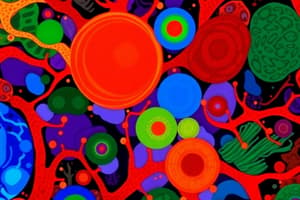Podcast
Questions and Answers
What is Biology primarily concerned with?
What is Biology primarily concerned with?
- The study of chemical reactions in laboratories
- The study of inanimate objects
- Understanding artificial intelligence
- The scientific study of life and living organisms (correct)
Which of the following fields is NOT covered by Biology?
Which of the following fields is NOT covered by Biology?
- Astronomy (correct)
- Genetics
- Microbiology
- Zoology
What aspect of living organisms does Biology NOT study?
What aspect of living organisms does Biology NOT study?
- Their interactions with the environment
- Their structure and function
- Their growth and development
- Their economic impact on society (correct)
How does Biology help us understand life?
How does Biology help us understand life?
Which statement best describes the significance of Biology?
Which statement best describes the significance of Biology?
What is the smallest unit that can carry out all functions of life?
What is the smallest unit that can carry out all functions of life?
Which of the following statements about unicellular organisms is true?
Which of the following statements about unicellular organisms is true?
What is true regarding the origin of cells?
What is true regarding the origin of cells?
Which characteristic is NOT true for multicellular organisms?
Which characteristic is NOT true for multicellular organisms?
What are the functions that organisms must carry out to stay alive?
What are the functions that organisms must carry out to stay alive?
What process leads to the formation of new cells?
What process leads to the formation of new cells?
What happens during cell division?
What happens during cell division?
Why are single cells generally not visible to the naked eye?
Why are single cells generally not visible to the naked eye?
What tool is primarily used to view cells that are too small to be seen with the naked eye?
What tool is primarily used to view cells that are too small to be seen with the naked eye?
Which statement is true about cell division?
Which statement is true about cell division?
What is the primary role of cells in living organisms?
What is the primary role of cells in living organisms?
Which of the following statements is true about bacteria?
Which of the following statements is true about bacteria?
What distinguishes multicellular organisms from unicellular organisms?
What distinguishes multicellular organisms from unicellular organisms?
How do cells function in comparison to factories?
How do cells function in comparison to factories?
Which characteristic is common to all organisms?
Which characteristic is common to all organisms?
Flashcards are hidden until you start studying
Study Notes
Biology
- The study of living organisms and life
- Includes structure, function, growth, evolution and interactions with their environment.
- Subfields include genetics, ecology, microbiology, and zoology.
- Helps us understand life processes and how organisms interact with each other.
Cells
- Basic building blocks of all living things.
- Smallest unit of life, like tiny factories.
- Carry out functions necessary for an organism's survival.
- Unicellular organisms have one cell.
- Multicellular organisms have trillions of cells working together.
Organisms
- Any living thing, such as a plant, animal, or fungus.
- Can be unicellular or multicellular.
- Bacteria are single-celled organisms.
- Humans are multicellular organisms.
Notes on Organisms
- Organisms grow, reproduce, respond to their environment, and carry out functions for survival.
Key Points
- Living things are called "Organisms."
- Cells are the smallest unit capable of life functions.
- Unicellular organisms are made up of one cell.
- Multicellular organisms are made up of many cells.
- Cells in multicellular organisms are specialized for specific functions.
- All cells come from other cells through cell division.
Cell Growth and Division
- Cell division creates new cells for replacement and growth.
- Single cells are usually too small to be seen without a microscope.
Studying That Suits You
Use AI to generate personalized quizzes and flashcards to suit your learning preferences.




